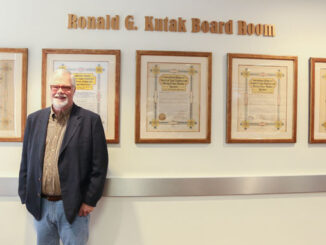
by Tris Carpenter

Bill Elias has retired. Those four words mean so much around here that I cannot possibly capture it in one article, but I’ll try. He has been a member of the Editors Guild since 1968, and has served on our Board of Directors since 1972. During most of that time, 28 years, Bill worked for Paramount doing airline and TV versions for ancillary markets.
One of the great things about Bill is that he is the institutional memory of our Board––he possesses the most precise recollections of Board meetings. Anyone who has spent more than two or three meetings with him has seen this acuity in action. Often during a discussion, Bill will recall a similar motion or action taken in the past. He will then proceed to summarize the issue (sometimes including the month and year the motion was passed!) and make some sage recommendation. Like any other Board member, Bill can’t convince everyone all the time, but I’d reckon that far more often than not, his advice is followed.
I bring this up because Bill has always advised me to talk about the Motion Picture Industry Pension and Health Plans pension and Individual Account Plan (IAP) as part of my organizing activities. He even went so far as to break it down for me into dollars and cents. According to his calculations, to get the monthly pension benefit check and health coverage he’s now getting, he would need somewhere in the neighborhood of $1.5 million in the bank. Moreover, that mill-and-a-half would have to be untouchable; he could never draw down from the principal in order to keep that check going for the rest of his life.
If you worked union for 29 years, there’d be something for you in the pension plan, and you could take that $12,000 and spend it on something else.
Now, unless you have a rich uncle, an insider stock trading tip or a plan to sell an LA- or New York City-area home and retire to some less expensive place like Burlington, Vermont or maybe Lincoln, Nebraska (not that there’s anything wrong with those places), you probably won’t have $1.5 million lying around at retirement, just waiting for you to draw interest from it. And saving that kind of cake is pretty difficult, too. You’d need to put away $12,000 a year (and more, as adjusted for inflation) for 29 years compounded at a respectable 5 percent just to get a cool million together. And that’s 29 years out, when a cool million won’t even be cool anymore.
Of course, if you worked union for 29 years, there’d be something for you in the pension plan, and that would have been paid by your employers. And you could take that $12,000 and spend it on something else. Or put it away and have a really spectacular retirement. Or buy a boat and sail to the Bahamas.
So, I’m taking Bill’s advice and talking about this. We often get caught up in the “perfect storm” that is the rising cost of healthcare as the major benefit of working union. Of course, health insurance is probably the most visible benefit of our plan, and certainly the one that is needed most when it’s missing. But the pension benefits are truly remarkable as well, and should not be forgotten when we think of good reasons to help organize a non-union production company or post house.





